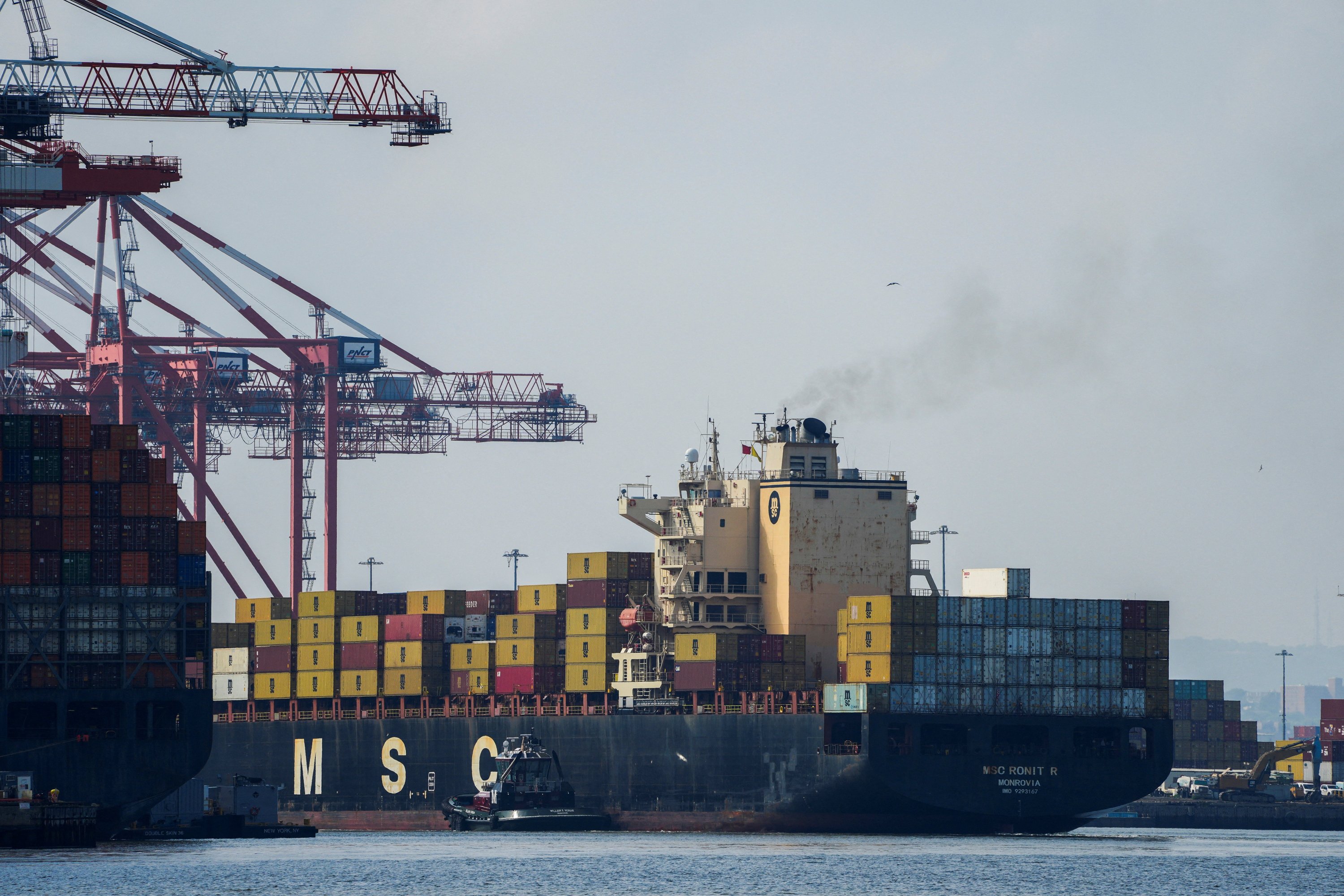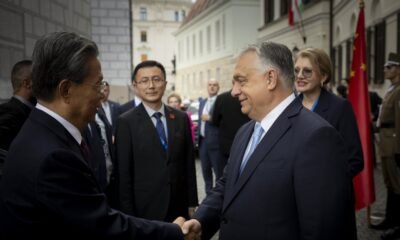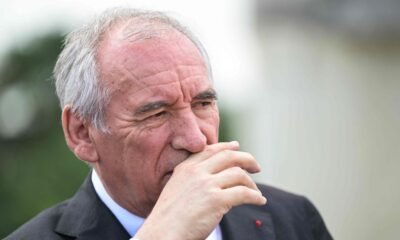Economy
Europe reacts with relief, concern, doubt to US trade deal
European governments and major companies reacted with a mixture of relief, concern and doubt on Monday to the framework trade deal struck with U.S. President Donald Trump, acknowledging what was seen as an unbalanced deal but one that avoided a deeper trade war.
The agreement, announced on Sunday between the two economies that account for almost a third of global trade, will see the U.S. impose a 15% import tariff on most EU goods – half the threatened rate but much more than what Europeans hoped for.
Many of the specifics of the deal were not immediately known, however.
“As we await full details of the new EU-U.S. trade agreement, one thing is clear: this is a moment of relief but not of celebration,” Belgian Prime Minister Bart De Wever wrote on X. “Tariffs will increase in several areas and some key questions remain unresolved.”
Trump said the deal, including an investment pledge topping the $550 billion deal signed with Japan last week, would expand ties between the trans-Atlantic powers after years of what he called unfair treatment of U.S. exporters.
It will bring clarity for European makers of cars, planes and chemicals. But the EU had initially hoped for a zero-for-zero tariff deal. And the 15% baseline tariff, while an improvement on the threatened rate of 30%, compares to an average U.S. import tariff rate of around 2.5% last year before Trump’s return to the White House.
European Commission chief Von der Leyen, describing Trump as a tough negotiator, told reporters on Sunday that it was “the best we could get.”
European stocks opened up on Monday, with the STOXX 600 at a four-month high and all other major bourses also in the green. Tech and health care stocks led the way.
“The 15% rate is better than the market was fearing,” said Jefferies economist Mohit Kumar.
German Chancellor Friedrich Merz welcomed the deal, saying it averted a trade conflict that would have hit Germany’s export-driven economy and its large auto sector hard.
More clarity but ‘not the end of the story’
French government ministers said on Monday that the deal had some merits – such as exemptions they hoped to see for some key French business sectors such as spirits – but was nevertheless not balanced.
Industry minister Marc Ferracci stressed more talks – potentially lasting weeks or months – would be needed before the deal could be formally concluded.
“This is not the end of the story,” he told RTL radio.
European companies, meanwhile, were left wondering whether to cheer or lament the accord.
“Those who expect a hurricane are grateful for a storm,” said Wolfgang Grosse Entrup, head of the German Chemical Industry Association VCI.
“Further escalation has been avoided. Nevertheless, the price is high for both sides. European exports are losing competitiveness. U.S. customers are paying the tariffs,” he said.
Stellantis shares were up 3.5% and car parts maker Valeo jumped 4.7% while German pharma group Merck KGaA rose 2.9%, in a sign of relief for those sectors.

Among the many questions that remain to be answered, however, is how the EU’s promise to invest hundreds of billions of dollars in the U.S. and steeply increase energy purchases can be turned into reality.
It was not immediately clear if specific pledges of increased investments were made or whether the details still must be hammered out.
And while the EU pledged to make $750 billion in strategic purchases over the next three years, including oil, liquefied natural gas (LNG) and nuclear fuel, the U.S. will struggle to produce enough to meet that demand.
While U.S. LNG production capacity is due to almost double over the next four years, it will still not be enough to ramp up supplies to Europe, and oil production is expected to be lower than previously forecast this year.
Despite the lingering unknowns, analysts stressed the deal still helped decrease uncertainty. Oil prices rose on Monday, as did the euro.
“Now that there is more clarity, you would think that not only in the United States, but around the globe, there will be a little bit more willingness to look at investment, to look at expansions, and to look at where the opportunities are,” said Rodrigo Catril, senior currency strategist at National Australia Bank.
Economy
Beating phobia: Japanese consumers now more accepting of price hikes
When Japanese ice pop maker Akagi Nyugyo raised its prices by only 10 yen ($ 0.07) in 2016, its somber-looking management appeared in a one-minute commercial, bowing silently in apology as a melancholy folk song lamented the inevitability of price hikes.
Almost a decade later, the Saitama-based company has changed its tune – a tongue-in-cheek advertising campaign last year promised in a series of photos to bow successively deeper for each of its subsequent three price hikes.
The lighter-hearted spin comes as Japanese firms, after decades of deflation, find a rare moment that allows them to raise prices without triggering the intense public backlash that once made such moves taboo.
“Compared to when we raised prices in 2016, I’d say there’s more of a sense now that the public is more accepting of price hikes,” the company’s marketing team leader Hideyuki Okamoto said. “The sentiment that price hikes are evil is receding.”
That shift in consumer mindset is driven by the most significant pay hikes in three decades and has given companies more confidence to pass on rising costs – something they long avoided for fear of losing customers. If sustained, the change could embolden the central bank to raise interest rates further, though that is dependent on just how much more households can absorb.

The Bank of Japan (BOJ) is expected to keep its benchmark rates unchanged at this week’s policy meeting but could signal its intention to resume rate hikes later in the year.
Japan’s consumer inflation has stayed above 2% for three years, mainly driven by rising food prices, a sharp departure from the decades of near-zero inflation that followed the asset bubble collapse in the early 1990s. Nearly 200 major food makers expect to hike prices for 2,105 items in July – up fivefold from year-before levels – by an average 15%, a private think tank survey showed recently.
“A few years ago, people would make a fuss over one or two items going up. Now it’s dozens, even hundreds. You can’t keep track anymore. There are just too many to remember,” said Fusako Usuba, a 79-year-old pensioner.
“But there’s no way around it, because we all need to eat to survive,” she added.
Wage growth
Japan’s wave of price hikes initially began in 2022, triggered by external shocks such as post-pandemic supply chain disruptions, the war in Ukraine and the yen’s subsequent depreciation.
However, economists argue that it is consumers’ greater tolerance for higher prices – underpinned by three consecutive years of robust wage growth – that has sustained the trend.
“Japanese consumers have come to realize they are now living in an era of persistent price increases,” said Tsutomu Watanabe, emeritus professor of economics at the University of Tokyo. He said consumers are beginning to shift their focus from low prices to higher wages, as intensifying labor shortages give workers more bargaining power.
According to a survey led by Watanabe, Japanese consumers were the most resistant to price hikes among five major countries four years ago, with a majority saying they would switch supermarkets if prices rose by 10%.
However, in the same survey last year, most respondents indicated that they would continue shopping at the same stores and purchasing the same items, aligning them with consumers in other countries.
The key question now is whether the trend is sustainable.
Meiji, Japan’s top chocolate maker, has implemented nine price hikes since 2022, reflecting the soaring costs of cocoa.
“Back in 2022, we met resistance from retailers asking us to hold off a bit longer,” said Akira Yoshida, general manager at Meiji’s cacao marketing division. “Nowadays, they accept our price hikes more smoothly, so we assume their customers are also reluctantly going along.”
But Meiji, which holds a 25% market share and effectively sets industry prices, is now seeing signs of price fatigue.
A 20% price hike in June, the biggest in recent years, led to a more than 20% drop in sales volume at some retailers, unlike in previous rounds where volume declines were smaller than the scale of price hikes.
“We’re increasingly concerned. There’s only so much more we can raise prices,” Yoshida said. “I think we’ll need to change how people view chocolate – not as a commodity, but as a luxury.”
Rei Ihara, a food sector analyst at UBS Securities, said the scope for further price hikes is narrowing, as Japan’s Engel coefficient – the share of household spending on food – reached 28.3% in 2024, the highest in 43 years.
“With prices rising year after year, consumers appear to be adjusting their purchasing habits, opting for less expensive options like chicken instead of beef, for example. For inflation to be sustainable, it must be supported by solid wage growth,” he said.
Inflation has outpaced nominal pay gains, pushing real wage growth into negative territory for months, fuelling frustration among voters that led to a major defeat of Prime Minister Shigeru Ishiba’s coalition in recent house elections.
The outlook for wage growth is increasingly uncertain due to sweeping U.S. tariffs. Japanese exporters have so far avoided major price hikes in the U.S. to stay competitive, sacrificing profits. If that continues, it could limit their ability to raise wages next year.
“We’re at a turning point now,” Watanabe said. “If this wage-driven price momentum fails, we may not see another opportunity like this in our lifetime. This moment is that rare.”
Economy
Euro struggles to recoup losses after EU-US trade deal
The euro struggled to recoup its steep losses early on Tuesday as investors understood that the terms of the trade deal between the U.S. and the European Union favored the former and hardly lifted the economic outlook of the bloc.
France, on Monday, called the framework trade agreement a “dark day” for Europe, saying the bloc had caved in to U.S. President Donald Trump with an unbalanced deal that slapped a headline 15% tariff on EU goods.
German Chancellor Friedrich Merz stated that his economy would suffer “significant” damage due to the agreed-upon tariffs.
The euro slid 1.3% in the previous session, its sharpest one-day percentage decline in over two months, amid concerns about growth and as euro-area government bond yields fell.
The common currency failed to recoup its losses and last traded 0.02% lower at $1.1584.
“It hasn’t taken long for markets to conclude that this relatively good news is still, in absolute terms, bad news as far as the near-term implications for eurozone growth are concerned,” said Ray Attrill, head of FX research at National Australia Bank.
“The deal has been roundly condemned by France while others – including German Chancellor Merz – are playing up the negative consequences for exporters, and with that, economic growth.”
The slide in the euro in turn boosted the dollar, which jumped 1% against a basket of currencies overnight.
The dollar held on to gains on Tuesday and knocked sterling to a two-month low of $1.3338. The yen edged 0.2% higher to 148.22 per dollar.
The dollar index steadied at 98.66.
“While the U.S. dollar’s strength … may reflect the perception that the new U.S.-EU deal is lopsided in favor of the U.S., the U.S. dollar’s strength may also reflect a feeling that the U.S. is re-engaging with the EU and with its major allies,” said Thierry Wizman, global FX and rates strategist at Macquarie Group.
Still, Trump said on Monday that most trading partners that do not negotiate separate trade deals would soon face tariffs of 15% to 20% on their exports to the United States, well above the broad 10% tariff he set in April.
Elsewhere, the Australian dollar rose 0.04% to $0.6524, while the New Zealand dollar was little changed at $0.5970.
The onshore yuan touched a one-week low of 7.1794 per dollar, with investors awaiting the outcome of trade talks between Washington and Beijing.
Top U.S. and Chinese economic officials met in Stockholm on Monday for more than five hours of talks aimed at resolving long-standing economic disputes at the center of a trade war between the world’s top two economies, seeking to extend a truce by three months.
Apart from trade negotiations, investors’ focus this week is also on rate decisions from the Federal Reserve (Fed) and the Bank of Japan (BOJ).
Both central banks are expected to stand pat on rates, but traders will watch subsequent comments to gauge the timing of their next moves.
Economy
UN urges Türkiye, Australia to end deadlock on COP31 hosting
Türkiye and Australia were called on Monday to resolve their long-running tussle over who will host next year’s COP31 summit, with the United Nations climate chief calling the delay unhelpful and unnecessary.
The two countries submitted bids to host the high-profile conference in 2022 and they have both refused to concede to the other ever since.
Simon Stiell, executive secretary of the U.N. Framework Convention on Climate Change, which oversees COP summits, said the deadlock was undermining preparations.
“A decision needs to be made very quickly,” he said at a Smart Energy Council event in Sydney. “The two proponents need to come together and between themselves and within the group to make that decision. The delay in making that decision is unhelpful to the process.”
The annual U.N. talks rotate through five regional groups. COP31’s host must be unanimously agreed upon by the 28 members of the Western Europe and Others Group (WEOG) bloc.
The U.N. had set a deadline of June for the group to reach consensus.
Despite Türkiye’s overwhelmingly greater experience in hosting global geopolitical events, its location and renewable energy sector, it has encountered pressure to drop out of the race. Ankara has instead doubled down on its efforts during interim talks in Bonn last month.
Ankara pointed out that its Mediterranean location would help reduce emissions from flights bringing delegates to the conference, and noted its substantially smaller oil and gas industry compared to Australia.
It has been promising a world-class COP31 venue in Antalya, a seaside city that has previously hosted the G-20, NATO conferences and the Antalya Diplomacy Forum.
Australia is seeking to co-host next year’s summit with the Pacific to showcase its renewable energy transition. It had hoped to secure the bid at COP29 in Azerbaijan.
The U.K., a WEOG member, last week reiterated its support for fellow Commonwealth country Australia, and “expressed the hope that a decision would soon be reached” during Australia-U.K. Ministerial Consultations held in Sydney. Australia and the U.K. have the same head of state.
Stiell said the deadlock was now affecting the planning of the COP process, involving thousands of delegates from 200 member countries.
“In negotiations that are as complex as they are, that lack of clarity creates tensions that are completely unnecessary at this stage,” he said.
Asked for comment, the office of Australian Climate Change Minister Chris Bowen referred to an interview where he claimed Australia’s bid had the backing of 23 out of 28 WEOG members.
Australia had also approached Türkiye multiple times to find a “win-win” solution, he said. “We’ve got the votes. We could have all the votes in the world. If Turkey is not going to withdraw, that’s still a challenge,” Bowen told The Conversation Politics Podcast on Thursday.
At the same event, Stiell also called on Australia to set an ambitious 2035 emissions target and accelerate its clean energy transition.
Australia’s national climate plan, due in September, would be a “defining moment” that could send a message that “this country is open for clean investment, trade, and long-term partnerships,” he said.
Brazil is hosting COP30 in November this year on behalf of the Latin American and Caribbean region. The event holds significance as it will focus on assessing countries’ updated climate targets for 2035. Analysts have referred to it as possibly the most pivotal summit since the 2015 Paris COP, where the key climate agreement was established.
Türkiye has felt the effects of climate change, with repeated extreme weather events, including heat waves. Major Turkish lakes, such as Lake Van in the east and Lake Tuz in Central Anatolia, are drying up.
In October 2021, Türkiye became the last Organisation for Economic Co-operation and Development (OECD) and G-20 country to sign the Paris Agreement on limiting the effects of climate change.
According to official statistics, 36.2% of Türkiye’s electricity was generated from coal in 2023, and 21% from natural gas. Hydropower contributed 19.3%, wind 10%, and solar power 7%.
Türkiye boasts more than 33 gigawatts (GW) of installed capacity in wind and solar energy. It plans to lift this figure to 120 GW by 2035, according to the government’s targets.
It aims at reducing greenhouse gas emissions in line with its commitment to become a net-zero emission economy by 2053.
At COP29 in Azerbaijan, a group of nations, including all European Union member states, Canada, Mexico and Norway, pledged to set climate targets aligned with the Paris Agreement’s aspirational goal of limiting warming to 1.5 degrees Celsius (2.8 degrees Fahrenheit). The U.S. did not join this commitment.
Experts hailed the announcement as a positive sign, particularly as the pace of the energy transition faces challenges and the world continues to break new high-temperature records each year.
Economy
Türkiye market inflation expectations fall to nearly 4-year low
Expectations for inflation in Türkiye in 12 months time dropped in July for market participants and businesses, while they rose for households, according to a central bank survey on Monday.
The market participants’ expectations fell by 1.2 percentage points to 23.4%, the Central Bank of the Republic of Türkiye (CBRT) said. Treasury and Finance Minister Mehmet Şimşek said that the level marked the lowest in nearly four years.
The real sector’s expectations declined by 0.8 percentage points to 39.0%. In contrast, household expectations rose by 1.5 percentage points to 54.5%.
The share of households expecting inflation to fall over the next 12 months dropped by 4.1 points to 26.6%.
Turkish annual consumer price inflation slowed to 35% in June, extending its fall from a peak of around 75% in May 2024. The central bank’s year-end inflation midpoint estimate currently stands at 24%, in a forecast range of 19% to 29%.
The CBRT has repeatedly said it closely monitors the alignment of inflation expectations and pricing behavior with its own projections. While household and business expectations remain elevated, market forecasts are more optimistic and closer to official targets.
“Inflation expectations for market participants and the real sector continued to decline compared to the previous month, while household expectations increased,” Şimşek wrote on social media platform X.
“Market participants’ expectation for inflation in 12 months time has fallen to 23.4%, the lowest level in 43 months,” he said.
Şimşek added that compared to last year, real sector and household expectations were down by 16 and 17.5 percentage points, respectively.
“With our resolutely implemented comprehensive policies, we are taking firm steps toward permanent price stability and sustainable growth,” the minister said.
On Sunday, Şimşek said the government expects inflation to end the year “within the central bank’s midpoint to high forecast range. We expect a figure below 29%.”
The central bank last week returned to its easing cycle as it cut its benchmark interest rate by a larger-than-expected 300 basis points to 43%, as disinflation continues.
Going forward, the bank said it would determine the “step size” of future monetary easing “prudently” and on a meeting-to-meeting basis. It also lowered the upper band of its rate corridor to 46% from 49%.
The bank hiked the policy rate to 46% from 42.5% in April, reversing an easing cycle that had begun in December, following market volatility over the arrest in March of Istanbul Mayor Ekrem Imamoğlu.
Imamoğlu was jailed pending trial over graft charges.
Şimşek on Sunday said the economy has returned to a “positive cycle” after market turbulence in March.
The bank said the underlying inflation trend remained flat in June and it anticipated a “temporary rise” in monthly inflation this month due to one-off factors.
Credit ratings agency Moody’s on Friday upgraded Türkiye’s rating to “Ba3” from “B1,” citing improving monetary policy credibility, easing inflation and reduced economic imbalances.
Economy
French PM Bayrou calls US trade deal ‘dark day for Europe’
French Prime Minister Francois Bayrou called a framework trade deal between the U.S. and European Union a “dark day” for Europe, saying the bloc had caved in to U.S. President Donald Trump’s pressure with an unbalanced deal that slaps a headline 15% tariff on EU goods while sparing U.S. imports from any immediate European retaliation.
The criticism from Bayrou followed months of French calls for EU negotiators to take a tougher stance against Trump by threatening reciprocal measures – a position that contrasted with the more conciliatory approaches of Germany and Italy.
“It is a dark day when an alliance of free peoples, brought together to affirm their common values and to defend their common interests, resigns itself to submission,” Bayrou wrote on X of what he called the “von der Leyen-Trump deal.”
The high-level French criticism and President Emmanuel Macron’s silence since the deal was signed between Trump and European Commission President Ursula von der Leyen stood in stark contrast to the more benign reactions from Berlin and Rome.
French government ministers acknowledged the agreement had some benefits – including exemptions for sectors such as spirits and aerospace – but said it remained fundamentally unbalanced.
“This state of affairs is not satisfactory and cannot be sustained,” French European Affairs Minister Benjamin Haddad said on X, urging the EU to activate its so-called anti-coercion instrument, which would allow for non-tariff retaliation.
Trade Minister Laurent Saint-Martin criticized the EU’s handling of the negotiations, saying the bloc should not have refrained from hitting back in what he described as a power struggle initiated by Trump.
“Donald Trump only understands force,” he told France Inter radio. “It would have been better to respond by showing our capacity to retaliate earlier. And the deal could have probably looked different,” he added.
Macron had said that the EU should respond in kind if Washington slapped tariffs on EU goods and apply equivalent measures on U.S. imports into the bloc, in particular on services, in which the U.S. enjoys a surplus with the EU.
However, the softer line advocated by German Chancellor Friedrich Merz and Italian Prime Minister Giorgia Meloni, whose countries are more dependent on exports to the U.S. than France, prevailed.
Economy
Orban slams US deal, says Trump ‘ate’ EU chief ‘for breakfast’
Hungarian Prime Minister Viktor Orban on Monday lashed out at a new trade deal the European Union reached a day earlier with the U.S., saying the agreement is “worse” than the deal the U.K. clinched.
“Donald Trump did not reach an agreement with Ursula von der Leyen, but rather Donald Trump ate Ursula von der Leyen for breakfast,” Orban said during a Facebook livestream hosted by his party’s spokesperson.
The framework trade agreement, which the U.S. and the EU agreed upon on Sunday, is worse than the trade deal that the U.K. reached with the U.S. earlier, he was also quoted as saying.
The deal imposes a 15% import tariff on most EU goods – half the threatened rate.
“This is not an agreement … (President) Donald Trump ate (European Commission President) Von der Leyen for breakfast, this is what happened and we suspected this would happen as the U.S. President is a heavyweight when it comes to negotiations, while Madame President is a featherweight,” Orban said.
-

 Lifestyle1 day ago
Lifestyle1 day agoSide Ancient City’s nighttime glow captivates visitors in Türkiye
-

 Daily Agenda3 days ago
Daily Agenda3 days agoLast minute | Historical moments in the defense industry: 48 signatures were signed for the sale of Kaan
-

 Lifestyle1 day ago
Lifestyle1 day agoNational Geographic highlights magic of Cappadocia
-

 Economy24 hours ago
Economy24 hours agoOrban slams US deal, says Trump ‘ate’ EU chief ‘for breakfast’
-

 Lifestyle24 hours ago
Lifestyle24 hours agoTürkiye’s Mediterranean paradise: Tourism spot for nature lovers
-

 Economy22 hours ago
Economy22 hours agoFrench PM Bayrou calls US trade deal ‘dark day for Europe’
-

 Daily Agenda3 days ago
Daily Agenda3 days agoCrises do not end in Buca Municipality: First salary is now promotion!
-

 Refugees2 days ago
Refugees2 days agoWildfires threaten Turkey’s fourth-largest city as locals are evacuated




